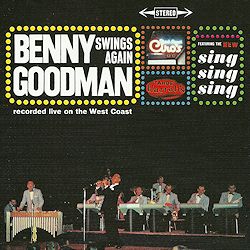1. Air Mail Special
2. Slipped Disc
3. Gotta Be This Or That
4. Where Or When
5. I Want To Be Happy
6. After You’ve Gone
7. Waiting For The Robert E. Lee
8. Bill Bailey Won’t You Please Come Home
9. Sing, Sing, Sing (With A Swing)
10. St James Infirmary
11. Air Mail Special
12. My Bay Done Tol’ Me
13. I Want To Be Happy
14. Runnin’ Wild
15. Gotta Be This Or That
16. After You’ve Gone
Collective personnel
Benny Goodman – Clarinet, vocals
Jack Sheldon – Trumpet
Flip Phillips – Tenor sax
Red Norvo – Vibes
Murray McEachern – Trombone
Jerry Dodgion – Alto sax
Russ Freeman - Piano
Jimmy Wyble - Guitar
Red Wootten - Bass
John Markham – Drums
Maria Marshall – Vocals (tracks 7-8)
Like a former rock star, Benny Goodman continued
long after the swing era performing his “greatest hits”. His repetitiveness
is confirmed by the fact that four of the seven “bonus tracks “ (numbers
10 to 16, recorded at various venues) are the same as tunes on the
original LP, which was recorded at Ciro’s in Hollywood. Most of this
album uses a ten-piece group, which spans the gap between Benny’s
big band and his smaller combos. On these recordings from 1959 and
1960, there are occasional hints of Goodman not being quite as agile
as he used to be. Can you believe that the King of Swing sometimes
sounds breathless? Yet he is still the main soloist and can achieve
some high-flying improvisations.
In fact Benny’s dominance tends to reduce the contributions of his talented sidemen. For instance, it would have been nice to hear more solos from
trumpeter Jack Sheldon, although he gets some chances to shine on such tracks as the first version of Air Mail Special, although the riffing
background tends to get in the way. On the other hand, vibist Red Norvo gets plenty of solos, which he executes with his usual dexterity. And saxists Flip
Phillips and Jerry Dodgion also make valuable contributions.
The band swings with the same ease as Goodman’s earlier groups,
but it would have been healthy to have included more new tunes instead
of the (admittedly) good-old-good ones. Benny even revives Sing,
Sing, Sing, a piece which is indelibly associated one drummer
on one special occasion. John Markham does his best, although he can’t
match the excitement of Gene Krupa’s original show-stopper. But Goodman’s
clarinet solo wittily quotes And The Angels Sing as well
as containing echoes of his Jewish background.
The personnel listings on the sleeve are confusing, as they fail to list the musicians on the bonus tracks (10 to 18). Red Norvo is listed as “out on 4 and
6” but I can hear a vibraphone on both these tracks. My Baby Done Tol’ Me has vocals by an unnamed singer, whose style is nearer R & B than
swing. Despite these flaws, if you loved Benny’s original recordings you will probably enjoy this album, even though it consists mainly of reruns.
Tony Augarde
www.augardebooks.co.uk
